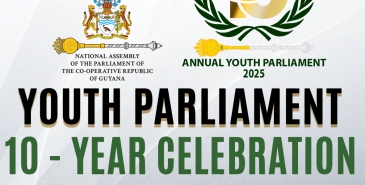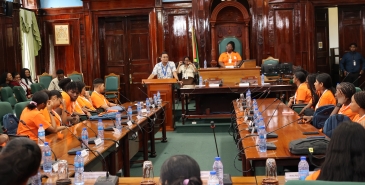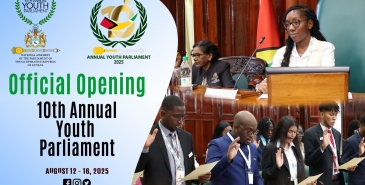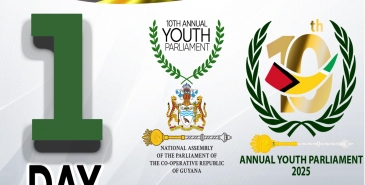Corporal Punishment
Speech delivered at: 28th Sitting - Tenth Parliament - 09 August, 2012
09 August, 2012
19966
Mr. B. Williams: Thank you Mdm. Chairperson. I trust I would not provoke such controversy. I seek your permission to speak to this motion with a special remit in the case of abolition of death penalty. This is a subject that engages the entire world.
In Guyana, the question is: what is the death penalty? The death penalty is not one of extrajudicial killing, but one that is sanctioned by the court. It is a sentence of death imposed by a court of law in relation to offences such as treason and murder and with specific reference to Guyana.
In other countries like China robbery and other forms of offences could attract the death penalty. In Guyana it is treason, murder and felony murder, i.e. if you are committing the felony of robbery which results in death then that amounts to murder. That is what is sanctioned by our Constitution and sanctioned by our law, the death penalty.
There are lawful mechanisms to avoid the death penalty or the sentence of death. It includes appeals to higher Courts. If you are sentenced to death by hanging in Guyana you could appeal to the Court of Appeal of Guyana. If you fail there you could now appeal to our last Court or resort, the Caribbean Court of Justice. If those efforts fail you, one could petition the United Nations Human Right Committee invoking any clause in the International Covenance of Civil and Political Rights, which we have adopted in Guyana. You can also petition the Inter-American Commission for Human Rights. If they fail, we have in Guyana what is called the “Prerogative of Mercy”. The “Prerogative of Mercy” is a Constitutional Mechanism which has an advisory committee headed by a Minister. The Minister is appointed by the President in whom the prerogative of mercy vests.
There are all of these mechanisms, and as you know, in a country like Guyana an appeal could take years. As a result of that the question arises of delay. Delay, when persons are on death row, people believe could have deleterious effects on the mind. In fact, people believe that it could amount to cruel, degrading and inhuman punishment. In fact, in our Constitution under article 141 one could approach the Courts on a Constitutional motion that one’s right to protection from cruel, inhuman and degrading punishment has been infringed by being held incarcerated for long periods without trial or without being hung rather or executed. That is the state of the mechanisms to avoid a sentence of death by a lawful Court in Guyana.
Around 1993, a case from Jamaica which went to the Privy Council of Pratt and the Attorney General, two persons where on death row for almost 14 years and they utilised the appellate mechanisms and they petitioned to the various human rights bodies. In fact the Prerogative of Mercy in Jamaica read the death warrant to them three times. In every occasion, they were saved by the bell just before they were executed. You could imagine that these men were living at all material times under the apprehension of death. It has been accepted to be one of the cruelest and degrading forms of treatment that could ever be meted out to a human being. There were there for in fact fourteen years, and finally when the matter was taken by a constitutional motion to the Court the Court held, and I would like to put this into the record just quickly, that the execution should follow as swiftly as practicable after sentence of death, subject to the allowance of a reasonable time for appeal and consideration of a reprieve. An appellate procedure that permitted prolonged delay for taking advantage of this, no fault could be attributed to a defendant which was compatible with capital punishment. That is very clear. You cannot have a systemic delay and blame it on the person who is on death row.
In Guyana, when all other countries in this region followed Pratt and the Attorney General, Barbados, St. Bradshaw and the like, we steadfastly refused in the early days to follow that. In Yassin and Thomas for example, they did everything almost akin to Pratt and still our Court of Appeal refused to give then any reprieve to commute their death sentence to life.
In Rampersuad and the Attorney General, the Director of Public Prosecutions, the delay was 6 ½ years and the Court referred to all those cases, Pratt Morgan, Yassin and Thomas and the like. They came down on the point very steadfast that it was not cruel and inhuman punishment to have someone on death row for 6 ½ years. We were behind the pale.
Internationally, the whole world was moving in a different direction. I am reading from this article, Death Penalty Debate and this is what it says, “Death penalty is just so last millennium”. In other words it is outdated. “More than two-thirds of countries around the world have abolished capital punishment. Most others use it rarely if ever and a clear majority have supported a United Nations resolution against it in each of last three years, 2010 to the present.
Most death penalty supporters believe that it is justified on one or more of the follow grounds: firstly, as a means of retribution, that is, they deserve it; secondly as a deterrent to others; thirdly, to prevent any danger of re-offending; fourthly, because it is cheaper than keeping people in prison. Opponents argue, that is one the other side of the coin, against the death penalty on one or more of the following grounds: firstly, killing someone is always wrong and two wrongs could never make a right; secondly, whatever people might think, there is in fact no evidence of a deterrent effect; thirdly, life without payroll is just as effective a roll to prevent someone re-offending as executing them; fourthly, saving money can never be justification for taking someone’s life; finally number five, mistakes are bound to happen and that means people being put to death for a crime they did not commit. Imagine if that were you or someone you love.” The debate rages on and we cannot be left to wallow on the muddy banks; we must take the tides that carries one on to fortune and fame.
The present situation in Guyana is that there are 29 persons on death row, all men. There were four persons, including Noel Thomas from Thomas and Yassin who were recently released by our Courts on an application that their constitutional rights to protection from cruel and inhuman punishment had been breached. Noel Thomas was there since 1988. He was incarcerated since 1988 and Chief Justice Chang relieved him in June 2012. Muntaz Ali was on death row since 1987. He was released in June also. Lawrence Chan, in 1996 he was incarcerated. Vishwanauth Singh was since 1993 or 1994. What we have is our constitutional Court, presided over by none other Chief Justice Chang, within the last month granted applications made for persons sentence of death to either be commuted or set aside. The question is whether this is a reflection that Guyana is moving towards the position that we should not execute persons under sentence of death.
Two women were incarcerated for years. Sanchari Singh died in prison in 2009. Is that not cruel and inhuman? Shareen Khan died in 2010; she was incarcerated since 1987. We cannot escape the whole question of debating. I am not sure whether that is why at the review this issue was not really forced upon our representatives.
The mechanism of the “Prerogative of Mercy” also ought to be employed in a more meaningful way. In fact, the tract record for the “Prerogative of Mercy” is not very good for persons on death row. Before 1998, warrants were read for five persons. The last execution was in 1997. Those were the Michael Archer and the Clark. In the 1990s there was one other person granted a reprieve under the “Prerogative of Mercy”. It should tell you that the “Prerogative of Mercy” has power to pardon any person, to commute a death sentence to life imprisonment, to substitute a less severe form of punishment and to grant respite indefinitely or for a specified period.
We have mechanisms in Guyana, which is in our Constitution, the Prerogative of Mercy, to really examine the status of persons on death row and make decisions in accordance with the powers given to them. The question is one that cannot escape us here in Guyana; it is an unshakable trend. In China also where thousands are believed to have been executed dissenting voices were heard. Peking University Law Professor, Zhang Qian Fang, argues for China to publish it figures on execution. He says only then can China’s rational debate on abolition of the death penalty begin.
Into executions, there is cry in the Middle East and North Africa. The use of the death penalty was recorded in Lebanon, the Palestinian Authority and Tunisia. In Morocco, the new Constitution adopted in 2011 enshrines the right to life in Article 20. In other words, these countries are moving away, and those countries which know about execution are moving away to either not executing people or abolishing the death penalty altogether. It is a challenge, and as the motion tells us in the last Whereas clause, the Special Select Committee must conduct consultations with the relevant stakeholders in Guyana.
The first BE IT RESOLVE clause tells us what should be the questions to be answered by these consultations. We, in the A Partnership for National Unity (APNU), agree that this questions of abolitions or not should go to a Select Committee which would conduct the consultations. It should consult the Bar Associations, other categories of stakeholders and indeed the Guyanese people to come up with an answer of whether we should abolish or not.
Even in those countries that continue to use the death penalty, progress was made in 2011. In the United States, Illinois became the 16th State to abolish the death penalty. China removed the death penalty for 13 crimes. Could you imagine they removed the death penalty for 13 crimes and still have crimes where the sentence of death is the penalty? In fact, they did that while adding at least two new capital crimes. Decreases in the use of the death penalty were recorded in Lebanon, the Palestinian Authority and Tunisia. At least 18,750 people remain under sentence of death at the end of the year and at least 680 people were executed worldwide in 2011 and that is excluding China.
In March, Governor Pat Quinn announced his intention to seek an end to the death penalty in Illinois USA, and he said, “The Evidence presented to me by former prosecutors and judges with decades of experience in the criminal justice system has convinced me that it is impossible to devise a system that is consistent, free of discrimination on the basis of race, geography or economic circumstance and that always gets it right.” Illinois became the 16th State to abolish the death penalty.
Mdm. Deputy Speaker, I will leave this Hon. House with these few observations. On the part of the APNU I will say that I support this question being remitted to a Special Select Committee which will then conduct consultations with the major stakeholders in Guyana. Thank you very much. [Applause]
Speech delivered by:
What's New

17 August, 2025
10th Annual Youth Parliament Closes: Celebrating a Decade of Impact, Excellence, and Youth Empowerment10th Annual Youth Parliament Closes: Celebrating a Decade of Impact, Excellence, and Youth Empower

13 August, 2025
Youth Parliamentarians Assemble for Grand Rehearsals for the 10th Annual Youth Parliament

12 August, 2025
10th Annual Youth Parliament Kicks Off – Young Voices, Bold Ideas, Bright Futures!

11 August, 2025
10th Annual Parliament Kicks off tomorrow

